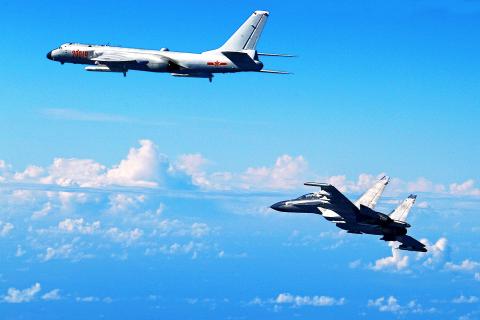Chinese military aircraft yesterday flew over the East China Sea to the south of Japan’s Okinawa Island and circled the international airspace surrounding Taiwan before passing over the Bashi Channel to return to China, officials from the Ministry of National Defense said.
It was the second time in two weeks that Chinese military aircraft have flown around Taiwan and passed over the Miyako Strait between Japan’s Okinawa and Miyako islands.
Yesterday’s flight launched at about 9am from the People’s Liberation Army (PLA) Air Force’s Eastern Theater Command bases and involved a dozen aircraft, the ministry said in a statement, adding that only four aircraft traveled the entire flight path around Taiwan.

Photo: (Shao Jing/Xinhua via AP)
Ministry officials did not provide any details on the type of aircraft that participated in the flight.
Two Xian H-6K bombers, a Tupolev Tu-154 surveillance aircraft and a Shaanxi Y-8 tactical transport aircraft participated in the previous flight on Nov. 25.
The aircraft taking part in yesterday’s flight were reportedly escorted by several Su-30 fighter jets coming in from the north as they crossed the Miyako Strait as per the PLA Air Force’s procedure for flying past the first island chain, before the main group turned south into international airspace.
They were similarly escorted after reaching airspace south of Taiwan as they flew over the Bashi Channel between Taiwan and the Philippines, before ending the mission and returning to their bases at 1:10pm, according to military sources.
The ministry said that the aircraft flew clockwise around Taiwan, whereas they flew counter-clockwise on Nov. 25.
"Our military forces monitored the PLA aircraft and had them under surveillance the entire time. There is no need to be concerned about the situation,” the statement read.
“After the PLA aircraft headed from the Chinese coast toward the East China Sea, Taiwan’s military radar stations locked onto them and tracked the entire flight,” said a senior military officer who declined to be named.
“The air force dispatched a reconnaissance patrol aircraft for surveillance and it took photographs of the Chinese aircraft and transmitted the images to a command station,” he said.
The ministry released the statement immediately after the incident. Following the Nov. 25 flight, the ministry’s delayed response drew criticism from the public and lawmakers, and raised concern that it had sought to cover up the incident.
Media reports said that neither flight infringed upon Taiwan’s or Japan’s territorial airspace, but this could not be independently verified.
Senior Chinese military officials in September announced that they will conduct “regular exercises” for flying past the first island chain, as China seeks to assert its presence in disputed islands and marine territories in the South and East China seas.
Taiwan has virtually identical claims in the South China Sea.

Intelligence agents have recorded 510,000 instances of “controversial information” being spread online by the Chinese Communist Party (CCP) so far this year, the National Security Bureau (NSB) said in a report yesterday, as it warned of artificial intelligence (AI) being employed to generate destabilizing misinformation. The bureau submitted a written report to the Legislative Yuan in preparation for National Security Bureau Director-General Tsai Ming-yen’s (蔡明彥) appearance before the Foreign Affairs and National Defense Committee today. The CCP has been using cognitive warfare to divide Taiwanese society by commenting on controversial issues such as Taiwan Semiconductor Manufacturing Co’s (TSMC, 台積電) investments in the

INVESTIGATION: The case is the latest instance of a DPP figure being implicated in an espionage network accused of allegedly leaking information to Chinese intelligence Democratic Progressive Party (DPP) member Ho Jen-chieh (何仁傑) was detained and held incommunicado yesterday on suspicion of spying for China during his tenure as assistant to then-minister of foreign affairs Joseph Wu (吳釗燮). The Taipei District Prosecutors’ Office said Ho was implicated during its investigation into alleged spying activities by former Presidential Office consultant Wu Shang-yu (吳尚雨). Prosecutors said there is reason to believe Ho breached the National Security Act (國家安全法) by leaking classified Ministry of Foreign Affairs information to Chinese intelligence. Following interrogation, prosecutors petitioned the Taipei District Court to detain Ho, citing concerns over potential collusion or tampering of evidence. The

‘COMPREHENSIVE PLAN’: Lin Chia-lung said that the government was ready to talk about a variety of issues, including investment in and purchases from the US The National Stabilization Fund (NSF) yesterday announced that it would step in to staunch stock market losses for the ninth time in the nation’s history. An NSF board meeting, originally scheduled for Monday next week, was moved to yesterday after stocks plummeted in the wake of US President Donald Trump’s announcement of 32 percent tariffs on Taiwan on Wednesday last week. Board members voted to support the stock market with the NT$500 billion (US$15.15 billion) fund, with injections of funds to begin as soon as today. The NSF in 2000 injected NT$120 billion to stabilize stocks, the most ever. The lowest amount it

NEGOTIATIONS: Taiwan has good relations with Washington and the outlook for the negotiations looks promising, Minister of Economic Affairs J.W. Kuo said Taiwan’s GDP growth this year is expected to decrease by 0.43 to 1.61 percentage points due to the effects of US tariffs, National Development Council (NDC) Minister Paul Liu (劉鏡清) said at a meeting of the legislature’s Economics Committee in Taipei yesterday, citing a preliminary estimate by a private research institution. Taiwan’s economy would be significantly affected by the 32 percent “reciprocal” tariffs slapped by the US, which took effect yesterday, Liu said, adding that GDP growth could fall below 3 percent and potentially even dip below 2 percent to 1.53 percent this year. The council has commissioned another institution